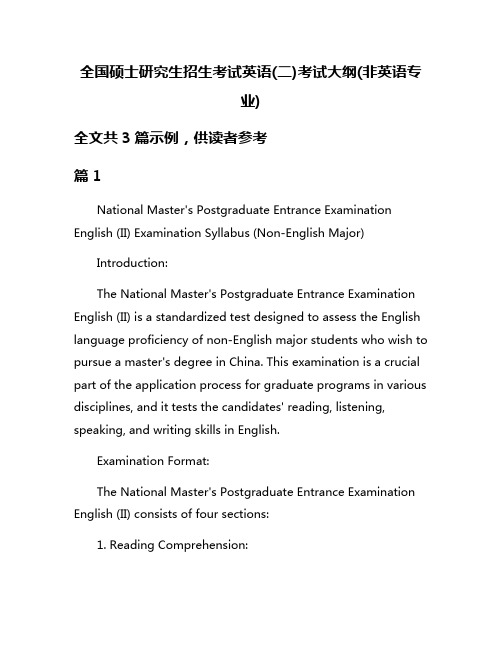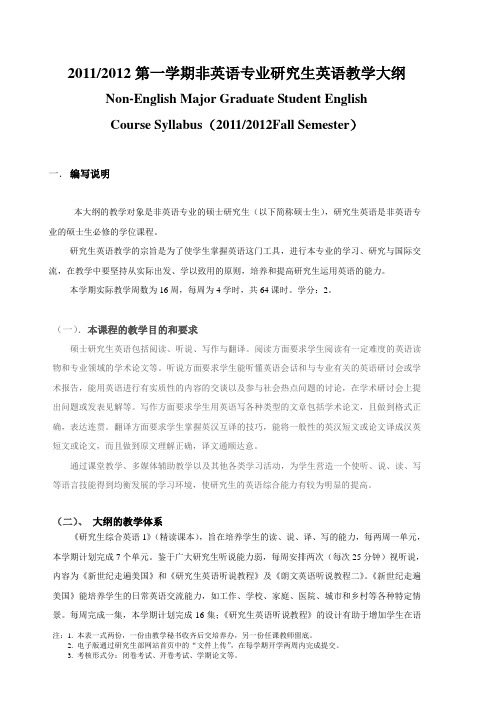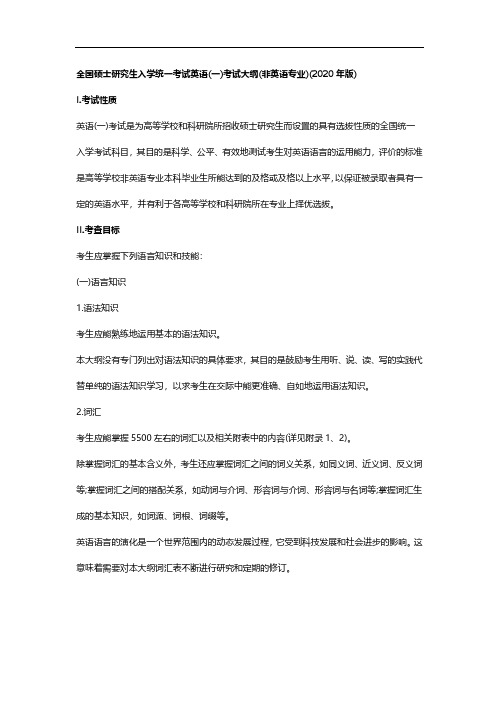《非英语专业研究生英语教学大纲》及名校博士研究生入学英语最新考试大纲收录核心词汇(M)
2024年博士研究生入学考试英语考试大纲

2024年博士研究生入学考试英语考试大纲2024 Doctoral Graduate Entrance Examination English Exam OutlineI. Listening ComprehensionThis section of the exam will test the candidates' ability to understand spoken English in academic and professional settings. Candidates will listen to a series of recordings, including lectures, conversations, and presentations, and answer multiple-choice questions based on the content. The topics will cover a wide range of subjects relevant to doctoral studies, such as research methods, literature reviews, and academic discussions.II. Reading ComprehensionIn this section, candidates will read academic texts, including scholarly articles, research papers, and book excerpts, and answer questions to demonstrate their understanding of the content. The passages will be of varying lengths and complexity, requiring candidates to identify main ideas, supporting details, and logical relationships within the text.III. Writing SkillsCandidates will be required to demonstrate their ability to write coherent and well-structured essays on a variety of topics related to their field of study. This section will test candidates' proficiency in academic writing, including the ability to formulate clear arguments, provide evidence to support their claims, and organize their ideas in a logical manner. Candidates may be asked to analyze a case study, evaluate a research question, or propose a research methodology.IV. Vocabulary and GrammarThis section will assess candidates' knowledge of vocabulary and grammar in academic English. Candidates will be tested on their ability to use complex vocabulary and grammar structures accurately and appropriately in written and spoken English. This section may include exercises on word meaning, word usage, sentence structure, and grammatical rules.V. Speaking SkillsCandidates will be required to engage in conversations and discussions on academic topics with examiners. This section will test candidates' ability to express ideas clearly and coherently, respond to questions, and engage in academic discourse. Candidates will be evaluated on their fluency, pronunciation, vocabulary usage, and grammar accuracy.Overall, the 2024 Doctoral Graduate Entrance Examination English Exam is designed to assess candidates' readiness for doctoral studies by evaluating their listening, reading, writing, speaking, vocabulary, and grammar skills in academic English. Candidates are encouraged to prepare thoroughly for the exam by practicing listening and reading comprehension, academic writing, vocabulary building, and speaking skills in English. Good luck to all the candidates!。
全国硕士研究生招生考试英语(二)考试大纲(非英语专业)

全国硕士研究生招生考试英语(二)考试大纲(非英语专业)全文共3篇示例,供读者参考篇1National Master's Postgraduate Entrance Examination English (II) Examination Syllabus (Non-English Major)Introduction:The National Master's Postgraduate Entrance Examination English (II) is a standardized test designed to assess the English language proficiency of non-English major students who wish to pursue a master's degree in China. This examination is a crucial part of the application process for graduate programs in various disciplines, and it tests the candidates' reading, listening, speaking, and writing skills in English.Examination Format:The National Master's Postgraduate Entrance Examination English (II) consists of four sections:1. Reading Comprehension:This section assesses the candidates' ability to understand and analyze written texts. The candidates will be required to answer multiple-choice questions based on a series of passages on various topics, such as science, history, literature, and social issues.2. Listening Comprehension:In this section, the candidates will listen to a series of recordings and answer multiple-choice questions based on the content of the recordings. The recordings may include conversations, lectures, and news reports.3. Speaking:The speaking section evaluates the candidates' ability to express their ideas and opinions in English. The candidates will be asked to respond to prompts on various topics and engage in discussions with the examiners.4. Writing:The writing section tests the candidates' ability to write coherent and well-organized essays in English. The candidates will be required to write an essay on a given topic within a specified time limit.Preparation Strategies:To excel in the National Master's Postgraduate Entrance Examination English (II), candidates should adopt the following preparation strategies:1. Practice regularly: Candidates should practice reading, listening, speaking, and writing in English on a daily basis to improve their language skills.2. Familiarize themselves with the examination format: Candidates should understand the format of the examination and practice past papers to become familiar with the types of questions that may appear on the test.3. Expand their vocabulary: Candidates should learn new words and phrases in English to enhance their ability to understand and express themselves effectively.4. Seek feedback: Candidates should seek feedback from teachers, tutors, or peers to improve their language proficiency and address any weaknesses in their English skills.Conclusion:The National Master's Postgraduate Entrance Examination English (II) is an important test for non-English major students who aspire to pursue a master's degree in China. By preparing systematically and diligently for the examination, candidates canenhance their English language skills and improve their chances of success in the competitive application process for graduate programs.篇2National Master's Entrance Examination in English(Non-English Major) Exam OutlineI. IntroductionThe National Master's Entrance Examination in English (Non-English Major) is a standardized test designed to evaluate the English language proficiency of non-English major graduate students in China. The exam is an important criterion for admission to various master's programs in English-speaking countries or other programs that require English language proficiency.II. Exam ContentThe exam consists of four sections: listening, reading, writing, and speaking. Each section tests different language skills and abilities, allowing for a comprehensive evaluation of the candidate's English proficiency.1. Listening:The listening section assesses the candidate's ability to understand spoken English in various contexts, including academic lectures, conversations, and radio broadcasts. Candidates are required to answer multiple-choice questions based on the audio materials they hear.2. Reading:The reading section tests the candidate's comprehension of written English texts, such as academic articles, essays, and reports. Candidates are expected to answer questions that assess their ability to analyze and interpret the information presented in the texts.3. Writing:The writing section evaluates the candidate's ability to express ideas clearly and coherently in written English. Candidates are asked to write essays or reports on given topics, demonstrating their skills in argumentation, logic, and organization.4. Speaking:The speaking section examines the candidate's ability to communicate effectively in spoken English. Candidates are required to participate in conversations, role-plays, orpresentations, demonstrating their fluency, pronunciation, and accuracy in speaking.III. Exam FormatThe exam is conducted in a computer-based format, with different sections administered at specified times. Candidates are allotted a specific amount of time for each section, with breaks provided between sections to ensure optimal performance.IV. ScoringThe exam is scored on a scale from 0 to 100, with each section weighted differently. The final score is a composite of the scores obtained in each section, providing an overall assessment of the candidate's English proficiency level.V. PreparationTo prepare for the National Master's Entrance Examination in English (Non-English Major), candidates are advised to practice regularly and familiarize themselves with the exam format and content. They can use study materials, attend preparatory courses, or seek guidance from English language tutors to improve their language skills.In conclusion, the National Master's Entrance Examination in English (Non-English Major) is a crucial assessment that determines the English language proficiency of non-English major graduate students seeking admission to master's programs. By understanding the exam outline, content, format, scoring, and preparation strategies, candidates can effectively prepare for the exam and increase their chances of success.篇3National Master's Entrance Examination English (Part II) Syllabus (Non-English Major)1. Listening Comprehension (30%)Part A: Listen and select the best response to the question you hear. (5 points)Part B: Listen and choose the best answer to the question you hear. (10 points)Part C: Listen and choose the statement that best summarizes the passage you hear. (5 points)Part D: Listen and choose the correct speaker for each statement. (5 points)Part E: Listen and fill in the blanks with the missing information you hear. (5 points)2. Grammar and Vocabulary (30%)Part A: Choose the word or phrase that best completes the sentence. (10 points)Part B: Choose the word(s) or phrase(s) that best explain the underlined word(s) or phrase(s). (10 points)Part C: Choose the word(s) or phrase(s) that best fits the blank in the sentence. (10 points)3. Reading Comprehension (30%)Part A: Read the passage and answer the questions. (10 points)Part B: Read the passage and fill in the blanks with the correct words or phrases. (10 points)Part C: Read the passage and choose the statement that best summarizes the passage. (10 points)4. Writing (10%)Part A: Write an article on a given topic. (10 points)Total: 100 pointsNote: The above exam syllabus is subject to change based on the examination committee's decision. Candidates are advised to prepare thoroughly by practicing sample questions and familiarizing themselves with the exam format. Good luck with your preparation!。
非英语专业研究生英语教学大纲

非英语专业研究生英语(第一外语) 教学大纲(试行)总则(一)为了保证达到《中华人民共和国学位条例暂行实施办法》中规定的外国语要求 , 进行非英语专业研究生英语课程的教学工作 , 特制定本大纲。
(二)研究生英语教学的宗旨是为了使学生掌握英语这门工具 , 进行本专业的学习、研究与国际交流 , 为我国的社会主义建设服务。
在教学中要坚持以实际出发、学以致用的原则 , 培养和提高研究生运用英语的能力。
硕士研究生的英语教学与考试(一) 教学对象本大纲的教学对象是非英语专业的硕士研究生(以下简称硕士生)。
硕士生入学时应达到以下水平:(1)理解性掌握4000个左右常用单词及370个左右的常用词组(即能正确识别词类 , 选择词义) , 对其中1500个左右基本词能复用性掌握(即能正确识别词类 , 选择词义 , 英汉互译 , 熟悉某些常用搭配和用法)并具有初步的构词知识;(2)掌握基本语法知识(具备大学英语覆盖的语法知识)(3)能阅读一般难度(相当于大学英语四级课文的难度)的英语读物 , 理解基本正确 , 阅读速度为每分钟50词左右;(4)能将一般难度的英语短文译成汉语 , 理解基本正确 , 译文达意;能将一般难度的汉语句子译成英语 , 内容表达与语法基本正确;(5)具有初步的写作能力。
硕士生中有一定数量单独考试入学的学生 , 其入学水平亦应逐步达到上述要求.(二) 教学目的硕士生英语教学的目的是培养学生具有较熟练的阅读能力 , 一定的写、译能力和基本的听、说能力 , 能够以英语为工具进行本专业的学习和研究。
对听、说能力要求较高的专业量可根据需要 , 加强听、说能力的培养。
(三)教学要求硕士生的英语教学包括基础英语和专业英语两部分。
1.基础英语部分(l)词汇理解性掌握5000个左右的常用单词及500个左右的词组,复用性掌握其中2000个左右的基本词。
认知120个左右常用词根和词缀,并能根据构词法识别派生词。
(2)语法能较熟练地运用语法知识 , 能理解语法结构复杂的长难句。
博士研究生英语教学改革实践研究

博士研究生英语教学改革实践研究作者:陈慧民马静刘小勇来源:《教育教学论坛》2020年第38期[摘要]随着高等教育国际化的不断发展,传统的博士研究生英语教学模式已经无法适应新形势下人才培养的需要,西安理工大学根据自身博士研究生英语教学过程中存在的不足,进行了一系列教学改革,有效的提高了博士生英语教学水平。
[关键词]博士研究生;英语教学;教学改革;英语口语;论文写作[作者简介]陈慧民(1981—),男,河南温县人,硕士,就职于西安理工大学研究生院培养办公室,主要从事研究生教育教学工作;马静(1971—),女,安徽蚌埠人,硕士,就职于西安理工大学研究生院培养办公室,主要从事研究生教育、科研竞赛工作;刘小勇(1980—),男,陕西西安人,硕士,就职于西安理工大学研究生院培养办公室,主要从事研究生教学、学籍管理工作。
[中图分类号]G642; ; [文献标识码]A; ; [文章编号]1674-9324(2020)38-0184-02; ; [收稿日期]2020-04-20我国的研究生教育根据授予学位的不同分为硕士研究生教育和博士研究生教育两种层次,其中博士研究生的英语教学水平不仅代表着我国英语教育的最高水平,而且关系到经济全球化时代国家科技实力和经济实力的提升。
教育部颁布的《非英语专业研究生英语教学大纲》表明,现阶段非英语专业博士研究生英语教学的宗旨是为了使学生更好地掌握英语这门工具,进行本专业学习、研究与国际交流,满足新世纪对高层次人才的要求,为国家的科技发展做贡献。
由此可见,大纲对博士研究生的听说读写和国际交流能力均作出了较高的要求。
因此,各高校应该依据国家、学校及个人的需求,因地制宜地进行外语教学,提高博士研究生英语应用能力和国际交流能力。
西安理工大学的博士研究生英语教学一直严格按照大纲的要求执行,但是随着近几年博士生招生规模的不断扩大,招生分数线的不断降低,博士生新生的英语水平整体呈下降趋势。
我校的博士生的英语教学仍然采用传统的以英语精读为主的教学模式,已经不能适应新形势下高等教育国际化的需求。
(完整word版)2020年硕士研究生入学考试统考英语二考试大纲

2020年硕士研究生入学考试统考英语二考试大纲(非英语专业)(2020年版)I.考试性质英语(二)考试主要是为高等院校和科研院所招收专业学位硕士研究生而设置的具有选拔性质的全国统一入学考试科目。
其目的是科学、公平、有效地测试考生对英语语言的运用能力,评价的标准是高等学校非英语专业本科毕业生所能达到的及格或及格以上水平,以保证被录取者具有一定的英语水平,并有利于各高等学校和科研院所在专业上择优选拔。
II.考查内容考生应掌握下列语言知识和技能:(一)语言知识1.语法知识考生应能熟练地运用基本的语法知识,其中包括:(1)名词、代词的数和格的构成及其用法;(2)动词时态、语态的构成及其用法;(3)形容词与副词的比较级和最高级的构成及其用法;(4)常用连接词的词义及其用法;(5)非谓语动词(不定式、动名词、分词)的构成及其用法;(6)虚拟语气的构成及其用法;(7)各类从句(定语从句、主语从句、表语从句等)及强调句型的结构及其用法;(8)倒装句、插入语的结构及其用法。
2.词汇考生应能较熟练地掌握5500个左右常用英语词汇以及相关常用词组(详见附录相关部分)。
考生应能根据具体语境、句子结构或上下文理解一些非常用词的词义。
(二)语言技能1.阅读考生应能读懂不同题材和体裁的文字材料。
题材包括经济、管理、社会、文化、科普等,体裁包括说明文、议论文和记叙文等。
根据阅读材料,考生应能:(1)理解主旨要义;(2)理解文中的具体信息;(3)理解语篇的结构和上下文的逻辑关系;(4)根据上下文推断重要生词或词组的含义;(5)进行一定的判断和推理;(6)理解作者的意图、观点或态度。
2.写作考生应能根据所给的提纲、情景或要求完成相应的短文写作。
短文应中心思想明确、切中题意、结构清晰、条理清楚、用词恰当、无明显语言错误。
III.考试形式、考试内容与试卷结构(一)考试形式考试形式为笔试。
考试时间为180分钟。
满分为100分。
试卷包括试题册和1张答题卡。
研究生英语教学大纲..1

2011/2012第一学期非英语专业研究生英语教学大纲Non-English Major Graduate Student EnglishCourse Syllabus(2011/2012Fall Semester)一.编写说明本大纲的教学对象是非英语专业的硕士研究生(以下简称硕士生),研究生英语是非英语专业的硕士生必修的学位课程。
研究生英语教学的宗旨是为了使学生掌握英语这门工具,进行本专业的学习、研究与国际交流,在教学中要坚持从实际出发、学以致用的原则,培养和提高研究生运用英语的能力。
本学期实际教学周数为16周,每周为4学时,共64课时。
学分:2。
(一).本课程的教学目的和要求硕士研究生英语包括阅读、听说、写作与翻译。
阅读方面要求学生阅读有一定难度的英语读物和专业领域的学术论文等。
听说方面要求学生能听懂英语会话和与专业有关的英语研讨会或学术报告,能用英语进行有实质性的内容的交谈以及参与社会热点问题的讨论,在学术研讨会上提出问题或发表见解等。
写作方面要求学生用英语写各种类型的文章包括学术论文,且做到格式正确,表达连贯。
翻译方面要求学生掌握英汉互译的技巧,能将一般性的英汉短文或论文译成汉英短文或论文,而且做到原文理解正确,译文通顺达意。
通过课堂教学、多媒体辅助教学以及其他各类学习活动,为学生营造一个使听、说、读、写等语言技能得到均衡发展的学习环境,使研究生的英语综合能力有较为明显的提高。
(二)、大纲的教学体系《研究生综合英语1》(精读课本),旨在培养学生的读、说、译、写的能力,每两周一单元,本学期计划完成7个单元。
鉴于广大研究生听说能力弱,每周安排两次(每次25分钟)视听说,内容为《新世纪走遍美国》和《研究生英语听说教程》及《朗文英语听说教程二》。
《新世纪走遍美国》能培养学生的日常英语交流能力,如工作、学校、家庭、医院、城市和乡村等各种特定情景。
每周完成一集,本学期计划完成16集;《研究生英语听说教程》的设计有助于增加学生在语篇层次上的听说能力,提高他们对所听材料的分析判断和归纳总结能力,以及用英语就一般性话题和专业话题表达观点的能力。
非英语专业研究生英语教学大纲PPT课件

• On the way through Harvard, she makes many friends, saves a wrongly accused woman from murder charges, and soon discovers …
Comprehension for Part 1(Para.1-2)
4. What food of thoughts can you get from Elle’s speech at the graduate ceremony?
无忧PPT整理发布
Notes
• 4.0 grade point average (GPA): all A’s for grades.
• LSAT: Law School Admission Test
• Movie: Legally Blonde 1 • Movie: Legally Blonde 2 • Speech :
• Graduate Students’ Competence and Commitment (HW) 无忧PPT整理发布
Gryou think of Elle’s pursuit (from boyfriend to her own career) as a graduate?
• At first, Elle is emotionally crushed, but she soon decides to get Warner back by applying to Harvard Law School herself, as a way of impressing him with how smart she really is.
Unit 1 From Competence to Commitment
(名校精编)2020考研大纲-英语一

全国硕士研究生入学统一考试英语(一)考试大纲(非英语专业)(2020年版)I.考试性质英语(一)考试是为高等学校和科研院所招收硕士研究生而设置的具有选拔性质的全国统一入学考试科目,其目的是科学、公平、有效地测试考生对英语语言的运用能力,评价的标准是高等学校非英语专业本科毕业生所能达到的及格或及格以上水平,以保证被录取者具有一定的英语水平,并有利于各高等学校和科研院所在专业上择优选拔。
II.考查目标考生应掌握下列语言知识和技能:(一)语言知识1.语法知识考生应能熟练地运用基本的语法知识。
本大纲没有专门列出对语法知识的具体要求,其目的是鼓励考生用听、说、读、写的实践代替单纯的语法知识学习,以求考生在交际中能更准确、自如地运用语法知识。
2.词汇考生应能掌握5500左右的词汇以及相关附表中的内容(详见附录1、2)。
除掌握词汇的基本含义外,考生还应掌握词汇之间的词义关系,如同义词、近义词、反义词等;掌握词汇之间的搭配关系,如动词与介词、形容词与介词、形容词与名词等;掌握词汇生成的基本知识,如词源、词根、词缀等。
英语语言的演化是一个世界范围内的动态发展过程,它受到科技发展和社会进步的影响。
这意味着需要对本大纲词汇表不断进行研究和定期的修订。
此外,全国硕士研究生入学英语统一考试是为非英语专业考生设置的。
考虑到交际的需要,考生还应自行掌握与本人工作或专业相关的词汇,以及涉及个人好恶、生活习惯和宗教信仰等方面的词汇。
(二)语言技能1.阅读考生应能读懂选自各类书籍和报刊的不同类型的文字材料(生词量不超过所读材料总词汇量的3%),还应能读懂与本人学习或工作有关的文献资料、技术说明和产品介绍等。
对所选材料,考生应能:1)理解主旨要义;2)理解文中的具体信息;3)理解文中的概念性含义;4)进行有关的判断、推理和引申;5)根据上下文推测生词的词义;6)理解文章的总体结构以及上下文之间的关系;7)理解作者的意图、观点或态度;8)区分论点和依据。
- 1、下载文档前请自行甄别文档内容的完整性,平台不提供额外的编辑、内容补充、找答案等附加服务。
- 2、"仅部分预览"的文档,不可在线预览部分如存在完整性等问题,可反馈申请退款(可完整预览的文档不适用该条件!)。
- 3、如文档侵犯您的权益,请联系客服反馈,我们会尽快为您处理(人工客服工作时间:9:00-18:30)。
M基础词汇magic [n.魔术,法术;魔力,魅力adj.魔术的;不可思议的【例句】Belief in magic still exists. 对魔法的迷信仍存在着。
【词组】as if by magic不可思议地【派生】magical adj. 魔术的;有魔力的magician n. 魔术师,变戏法的人magnify [] v.放大,扩大;夸大【例句】She is inclined to magnify her troubles. 她喜欢夸大她的困难。
【词组】magnify oneself自夸,自大【派生】magnification n. 放大;放大率;放大的复制品maid [] n.女佣;未婚少女;未婚女子【例句】Ask the hour maid servant to wash the dirt off the floor. 叫那个女钟点工把地板上的污垢擦掉。
maiden [] n.少女,处女adj.首次的,初次的;未婚的,处女的【例句】The young man betrothed the neighboring maiden.这名男青年答应娶邻居的少女为妻。
majority [] n.大部分,大多数【例句】His opinion represents that of the majority. 他的意见代表大多数人的意见。
【词组】majority of 大多数;大部分mammal [] n.哺乳动物【例句】A whale is a kind of mammal. 鲸是一种哺乳动物。
managerial [] adj.经理的,管理的【例句】He has also had managerial experience on every level. 他还有各个层级的管理经验。
manifest [] adj.明显的,易明白的v.表明,显示【例句】He manifested in his behavior a strong dislike for the girl. 他的行为表明他对那女孩极端厌恶。
【派生】manifestly adv. 显然地;明白地manifestation n. 表现;显示;示威运动manipulate [] v.熟练地使用,巧妙地处理;操纵,摆布【例句】①Mr. Smith manipulates the ivory chopsticks with great dexterity. 史密斯先生非常熟练地使用象牙筷。
②She uses her charm to manipulate people. 她利用其魅力左右他人。
【派生】manipulation n. 操纵;操作;处理;篡改mansion [] n.大厦;宅第,公馆【例句】A rich man’s mansion is difficult of access. 侯门似海。
【词组】executive mansion n. 白宫;州长官邸A Dream of Red Mansion《红楼梦》manual [] adj.手工的,用手的;体力的n.手册,指南【例句】They were wearied out with the strenuous manual labour. 他们被繁重的体力劳动搞得精疲力竭。
【派生】manually adv. 手动地;用手manuscript [] n.手稿,原稿【例句】The editors have polished the manuscript. 编辑们为这篇底稿进行了润色。
marble [] n.大理石adj.大理石的,大理石般的【例句】The pillars of the hall are made of marble. 大厅的柱子是大理石做的。
【词组】lose one’s marbles失去理智;气疯了March [] n.三月march [] v.& n. (如士兵般)行进【例句】①The band struck up the wedding march. 乐队开始演奏婚礼进行曲。
②His mother marched him right off home with her. 他母亲让他马上跟她回家。
【词组】march in 进入;(运动员)进场march on 行进,向前进;向……推进;进入检阅场地march against 朝……进军;向……推进n.页边的空白处;余额,富裕;边界,边缘地区【例句】There was a nice red tick in the margi n.边上打了一个漂亮的红勾。
marine [] adj.海的,海里的;船舶的,航海的n.海运业;海军陆战队士兵【例句】Marine creatures are those which live in the sea. 海洋生物是生存在海里的生物。
marsh [] n.沼泽,沼泽地区【例句】They sometimes sank knee-deep into the marsh. 他们不时陷入没膝的湿地。
战争的;军事的【例句】She is expert at martial arts. 她的武术练到家了。
【词组】martial art 武术(源于东方的几种搏斗技巧)【派生】martially adv勇敢地;好战地marvel [] n.令人惊奇的事物v.惊奇,惊异【例句】①The operation was a marvel of medical skill. 这次手术是医术上的一个奇迹。
②The foreign tourists marvel at the fine view of the West Lake. 外国旅游者惊叹西湖的优美景色。
【词组】marvel at 对……惊奇n.马克思主义【例句】We should study the basic principles of Marxism Leninism. 我们应当学习马列主义的基本原理。
n.马克思主义者【例句】She always takes a Marxist line. 她一贯奉行马克思主义路线。
v.掩饰,伪装【例句】Her smile masked true feelings. 她的微笑掩饰了她的感情。
【词组】under the mask of 在……假面具下;假借……之名;假称;假托mask off 屏蔽【派生】masking n. 掩蔽;隐蔽mass [] n.一大块,大堆;许多,大量;群众,民众adj.群众的,大规模的【例句】The time appointed for the mass meeting was 9 a.m. 群众大会上午9点届时召开。
【词组】in mass 整个的;全部的a mass of大量的the mass of 大多数mass media(电视、报纸等)大众传播媒体【派生】massive adj. 大量的;巨大的,厚重的;魁伟的massive [] adj.巨大的,大而结实的;大量的,大规模的,强大的【例句】The wedding got massive media coverage. 婚礼得到大众传播媒介的广泛报道。
mastery [] n.控制权,统治权;精通,掌握【例句】He has great mastery of chess. 他有高超的棋艺。
【词组】get mastery of紧紧地掌握住某事物the mastery of the seas制海权the mastery of the air制空权to struggle for the mastery决一雌雄mat [] n.席子,垫子【例句】There was a letter on the mat. 地毯上有一封信。
maze [] n.迷宫;混乱,迷惑【例句】Trees made the meadow a bowery maze. 树木使草原成了绿荫处处的迷宫。
meadow [] n.草地,牧地【例句】Cows are grazing in the meadow. 牛在草地上吃草。
adj.可量度的,可测量的;明显的,相当大的【例句】So far the effect is barely measurable. 迄今为止,效果微乎其微。
mechanism [] n.机械装置;结构,机制,机构【例句】The mechanism of local government is far from perfect. 地方政府的结构还很不完善。
medal [] n.勋章,奖牌,徽章【例句】He received a medal for his heroism. 他由于英勇而获得一枚奖章。
melon [] n.瓜,甜瓜【例句】I bought this melon at half the price. 我花一半价钱买了这个西瓜。
membership [] n.会员资格;全体成员;成员数【例句】Residence in the area qualifies you for membership. 只要在本区居住就可入会。
memorable [] adj.值得纪念的,难忘的【例句】The veteran soldier has fought many memorable battles. 这个老兵参加过许多难忘的战斗。
